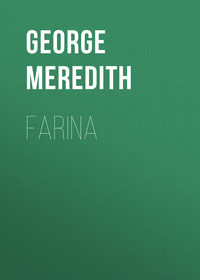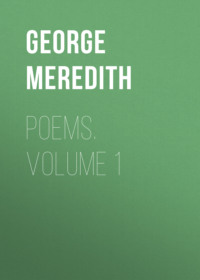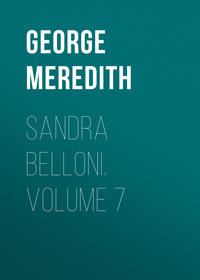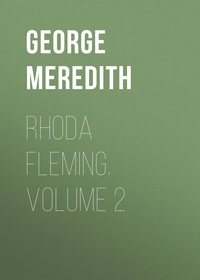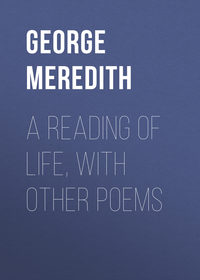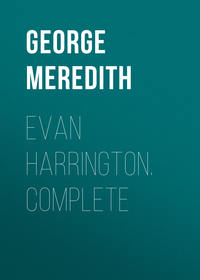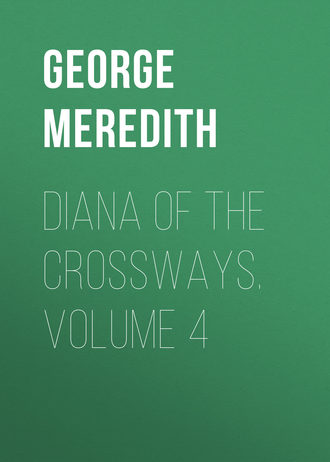
Diana of the Crossways. Volume 4
It signified an immediate appeal to the usurers, unless the publisher could be persuaded, with three parts of the book in his hands, to come to the rescue. Work! roared old Debit, the sinner turned slavedriver.
Diana smoothed her wrists, compressing her lips not to laugh at the simulation of an attitude of combat. She took up her pen.
And strange to think, she could have flowed away at once on the stuff that Danvers delighted to read!—wicked princes, rogue noblemen, titled wantons, daisy and lily innocents, traitorous marriages, murders, a gallows dangling a corpse dotted by a moon, and a woman bowed beneath. She could have written, with the certainty that in the upper and the middle as well as in the lower classes of the country, there would be a multitude to read that stuff, so cordially, despite the gaps between them, are they one in their literary tastes. And why should they not read it? Her present mood was a craving for excitement; for incident, wild action, the primitive machinery of our species; any amount of theatrical heroics, pathos, and clown-gabble. A panorama of scenes came sweeping round her.
She was, however, harnessed to a different kind of vehicle, and had to drag it. The sound of the house-door shutting, imagined perhaps, was a fugitive distraction. Now to animate The Man of Two Minds!
He is courting, but he is burdened with the task of tasks. He has an ideal of womanhood and of the union of couples: a delicacy extreme as his attachment: and he must induce the lady to school herself to his ideal, not allowing her to suspect him less devoted to her person; while she, an exacting idol, will drink any quantity of idealization as long as he starts it from a full acceptance of her acknowledged qualities. Diana could once have tripped the scene along airily. She stared at the opening sentence, a heavy bit of moralized manufacture, fit to yoke beside that on her view of her bank-book.
'It has come to this—I have no head,' she cried.
And is our public likely to muster the slightest taste for comic analysis that does not tumble to farce? The doubt reduced her whole MS. to a leaden weight, composed for sinking. Percy's addiction to burlesque was a further hindrance, for she did not perceive how her comedy could be strained to gratify it.
There was a knock, and Danvers entered. 'You have apparently a liking for late hours,' observed her mistress. 'I told you to go to bed.' 'It is Mr. Dacier,' said Danvers. 'He wishes to see me?' 'Yes, ma'am. He apologized for disturbing you.' 'He must have some good reason.' What could it be! Diana's glass approved her appearance. She pressed the black swell of hair above her temples, rather amazed, curious, inclined to a beating of the heart.
CHAPTER XXXI
A CHAPTER CONTAINING GREAT POLITICAL NEWS AND THEREWITH AN INTRUSION OF THE LOVE-GOD
Dacier was pacing about the drawing-room, as in a place too narrow for him.
Diana stood at the door. 'Have you forgotten to tell me anything I ought to know?'
He came up to her and shut the door softly behind her, holding her hand. 'You are near it. I returned . . But tell me first:—You were slightly under a shadow this evening, dejected.'
'Did I show it?'
She was growing a little suspicious, but this cunning touch of lover-like interest dispersed the shade.
'To me you did.'
'It was unpardonable to let it be seen.'
'No one else could have observed it.'
Her woman's heart was thrilled; for she had concealed the dejection from
Emma.
'It was nothing,' she said; 'a knot in the book I am writing. We poor authors are worried now and then. But you?'
His face rippled by degrees brightly, to excite a reflection in hers.
'Shall I tune you with good news? I think it will excuse me for coming back.'
'Very good news?'
'Brave news, as far as it goes.'
'Then it concerns you!'
'Me, you, the country.'
'Oh! do I guess?' cried Diana. 'But speak, pray; I burn.'
'What am I to have for telling it?'
'Put no price. You know my heart. I guess—or fancy. It relates to your Chief?'
Dacier smiled in a way to show the lock without the key; and she was insensibly drawn nearer to him, speculating on the smile.
'Try again,' said he, keenly appreciating the blindness to his motive of her studious dark eyes, and her open-lipped breathing.
'Percy! I must be right.'
'Well, you are. He has decided!'
'Oh! that is the bravest possible. When did you hear?'
'He informed me of his final decision this afternoon.'
'And you were charged with the secret all the evening, and betrayed not a sign! I compliment the diplomatic statesman. But when will it be public?'
'He calls Parliament together the first week of next month.'
'The proposal is—? No more compromises!'
'Total!'
Diana clapped hands; and her aspect of enthusiasm was intoxicating. 'He is a wise man and a gallant Minister! And while you were reading me through, I was blind to you,' she added meltingly.
'I have not made too much of it?' said he.
'Indeed you have not.'
She was radiant with her dark lightnings, yet visibly subject to him under the spell of the news he had artfully lengthened out to excite and overbalance her:—and her enthusiasm was all pointed to his share in the altered situation, as he well knew and was flattered in knowing.
'So Tony is no longer dejected? I thought I could freshen you and get my excuse.'
'Oh! a high wind will make a dead leaf fly like a bird. I soar. Now I do feel proud. I have longed for it—to have you leading the country: not tugged at like a waggon with a treble team uphill. We two are a month in advance of all England. You stand by him?—only to hear it, for I am sure of it!'
'We stand or fall together.'
Her glowing look doated on the faithful lieutenant.
'And if the henchman is my hero, I am but a waiting-woman. But I must admire his leader.'
'Tony!'
'Ah! no,' she joined her hands, wondering whither her armed majesty had fled; 'no softness! no payments! Flatter me by letting me think you came to a head not a silly woman's heart, with one name on it, as it has not to betray. I have been frank; you need no proofs . . .' The supplicating hands left her figure an easy prey to the storm, and were crushed in a knot on her bosom. She could only shrink. 'Ah! Percy . . you undo my praise of you—my pride in receiving you.'
They were speechless perforce.
'You see, Tony, my dearest, I am flesh and blood after all.'
'You drive me to be ice and door-bolts!'
Her eyes broke over him reproachfully.
'It is not so much to grant,' he murmured.
'It changes everything between us.'
'Not me. It binds me the faster.'
'It makes me a loathsome hypocrite.'
'But, Tony! is it so much?'
'Not if you value it low.'
'But how long do you keep me in this rag-puppet's state of suspension?'
'Patience.'
'Dangling and swinging day and night!'
'The rag-puppet shall be animated and repaid if I have life. I wish to respect my hero. Have a little mercy. Our day will come: perhaps as wonderfully as this wonderful news. My friend, drop your hands. Have you forgotten who I am? I want to think, Percy!'
'But you are mine.'
'You are abasing your own.'
'No, by heaven!'
'Worse, dear friend; you are lowering yourself to the woman who loves you.'
'You must imagine me superhuman.'
'I worship you—or did.'
'Be reasonable, Tony. What harm! Surely a trifle of recompense? Just to let me feel I live! You own you love me. Then I am your lover.'
'My dear friend Percy, when I have consented to be your paramour, this kind of treatment of me will not want apologies.'
The plain speaking from the wound he dealt her was effective with a gentleman who would never have enjoyed his privileges had he been of a nature unsusceptible to her distinct wish and meaning.
He sighed. 'You know how my family bother me. The woman I want, the only woman I could marry, I can't have.'
'You have her in soul.'
'Body and soul, it must be! I believe you were made without fire.'
'Perhaps. The element is omitted with some of us happily, some think. Now we can converse. There seems to be a measurement of distances required before men and women have a chance with their brains:—or before a man will understand that he can be advised and seconded. When will the Cabinet be consulted?'
'Oh, a few days. Promise me . . .'
'Any honourable promise!'
'You will not keep me waiting longer than the end of the Session?'
'Probably there will be an appeal to the country.'
'In any case, promise me: have some compassion.'
'Ah, the compassion! You do not choose your words, Percy, or forget who is the speaker.'
'It is Tony who forgets the time she has kept her lover dangling.
Promise, and I will wait.'
'You hurt my hand, sir.'
'I could crack the knuckles. Promise!'
'Come to me to-morrow.'
'To-morrow you are in your armour-triple brass! All creation cries out for now. We are mounted on barbs and you talk of ambling.'
'Arthur Rhodes might have spoken that.'
'Rhodes!' he shook off the name in disgust. 'Pet him as much as you like; don't . . .' he was unable to phrase his objection.
She cooled him further with eulogies of the chevaleresque manner of speaking which young Mr. Rhodes could assume; till for very wrath of blood—not jealousy: he had none of any man, with her; and not passion; the little he had was a fitful gust—he punished her coldness by taking what hastily could be gathered.
Her shape was a pained submission; and she thought: Where is the woman who ever knows a man!—as women do think when one of their artifices of evasion with a lover, or the trick of imposingness, has apparently been subduing him. But the pain was less than previously, for she was now mistress of herself, fearing no abysses.
Dacier released her quickly, saying: 'If I come tomorrow, shall I have the promise?'
She answered: 'Be sure I shall not lie.'
'Why not let me have it before I go?'
'My friend, to tell you the truth, you have utterly distracted me.'
'Forgive me if I did hurt your hand.'
'The hand? You might strike it off.'
'I can't be other than a mortal lover, Tony. There's the fact.'
'No; the fault is mine when I am degraded. I trust you: there's the error.'
The trial for Dacier was the sight of her quick-lifting; bosom under the mask of cold language: an attraction and repulsion in union; a delirium to any lover impelled to trample on weak defences. But the evident pain he inflicted moved his pity, which helped to restore his conception of the beauty of her character. She stood so nobly meek. And she was never prudish, only self-respecting. Although the great news he imparted had roused an ardent thirst for holiday and a dash out of harness, and he could hardly check it, he yielded her the lead.
'Trust me you may,' he said. 'But you know—we are one. The world has given you to me, me to you. Why should we be asunder? There's no reason in it.'
She replied: 'But still I wish to burn a little incense in honour of myself, or else I cannot live. It is the truth. You make Death my truer friend, and at this moment I would willingly go out. You would respect me more dead than alive. I could better pardon you too.'
He pleaded for the red mouth's pardon, remotely irritated by the suspicion that she swayed him overmuch: and he had deserved the small benevolences and donations of love, crumbs and heavenly dews!
'Not a word of pardon,' said Diana. 'I shall never count an iota against you "in the dark backward and abysm of Time." This news is great, and I have sunk beneath it. Come tomorrow. Then we will speak upon whatever you can prove rational. The hour is getting late.'
Dacier took a draught of her dark beauty with the crimson he had kindled over the cheeks. Her lips were firmly closed, her eyes grave; dry, but seeming to waver tearfully in their heavy fulness. He could not doubt her love of him; and although chafing at the idea that she swayed him absurdly—beyond the credible in his world of wag-tongues—he resumed his natural soberness, as a garment, not very uneasily fitting: whence it ensued—for so are we influenced by the garb we put on us—that his manly sentiment of revolt in being condemned to play second, was repressed by the refreshment breathed on him from her lofty character, the pure jewel proffered to his, inward ownership.
'Adieu for the night,' he said, and she smiled. He pressed for a pressure of her hand. She brightened her smile instead, and said only: 'Good night, Percy.'
CHAPTER XXXII
WHEREIN WE BEHOLD A GIDDY TURN AT THE SPECTRAL CROSSWAYS
Danvers accompanied Mr. Dacier to the house-door. Climbing the stairs, she found her mistress in the drawing-room still.
'You must be cold, ma'am,' she said, glancing at the fire-grate.
'Is it a frost?' said Diana.
'It's midnight and midwinter, ma'am.'
'Has it struck midnight?'
The mantel-piece clock said five minutes past.
'You had better go to bed, Danvers, or you will lose your bloom. Stop; you are a faithful soul. Great things are happening and I am agitated. Mr. Dacier has told me news. He came back purposely.'
'Yes, ma'am,' said Danvers. 'He had a great deal to tell?'
'Well, he had.' Diana coloured at the first tentative impertinence she had heard from her maid. 'What is the secret of you, Danvers? What attaches you to me?'
'I'm sure I don't know, ma'am. I'm romantic.'
'And you think me a romantic object?'
'I'm sure I can't say, ma'am. I'd rather serve you than any other lady; and I wish you was happy.'
'Do you suppose I am unhappy?'
'I'm sure—but if I may speak, ma'am: so handsome and clever a lady! and young! I can't bear to see it.'
'Tush, you silly woman. You read your melting tales, and imagine. I must go and write for money: it is my profession. And I haven't an idea in my head. This news disturbs me. Ruin if I don't write; so I must.—I can't!'
Diana beheld the ruin. She clasped the great news for succour. Great indeed: and known but to her of all the outer world. She was ahead of all—ahead of Mr. Tonans!
The visionary figure of Mr. Tonans petrified by the great news, drinking it, and confessing her ahead of him in the race for secrets, arose toweringly. She had not ever seen the Editor in his den at midnight. With the rumble of his machinery about him, and fresh matter arriving and flying into the printing-press, it must be like being in the very furnace-hissing of Events: an Olympian Council held in Vulcan's smithy. Consider the bringing to the Jove there news of such magnitude as to stupefy him! He, too, who had admonished her rather sneeringly for staleness in her information. But this news, great though it was, and throbbing like a heart plucked out of a breathing body, throbbed but for a brief term, a day or two; after which, great though it was, immense, it relapsed into a common organ, a possession of the multitude, merely historically curious.
'You are not afraid of the streets at night?' Diana said to her maid, as they were going upstairs.
'Not when we're driving, ma'am,' was the answer.
THE MAN OF TWO MINDS faced his creatrix in the dressing-room, still delivering that most ponderous of sentences—a smothering pillow!
I have mistaken my vocation, thought Diana: I am certainly the flattest proser who ever penned a line.
She sent Dangers into the bedroom on a trifling errand, unable to bear the woman's proximity, and oddly unwilling to dismiss her.
She pressed her hands on her eyelids. Would Percy have humiliated her so if he had respected her? He took advantage of the sudden loss of her habitual queenly initiative at the wonderful news to debase and stain their intimacy. The lover's behaviour was judged by her sensations: she felt humiliated, plucked violently from the throne where she had long been sitting securely, very proudly. That was at an end. If she was to be better than the loathsomest of hypocrites, she must deny him his admission to the house. And then what was her life!
Something that was pressing her low, she knew not how, and left it unquestioned, incited her to exaggerate the indignity her pride had suffered. She was a dethroned woman. Deeper within, an unmasked actress, she said. Oh, she forgave him! But clearly he took her for the same as other women consenting to receive a privileged visitor. And sounding herself to the soul, was she so magnificently better? Her face flamed. She hugged her arms at her breast to quiet the beating, and dropped them when she surprised herself embracing the memory. He had brought political news, and treated her as—name the thing! Not designedly, it might be: her position invited it. 'The world had given her to him.' The world is always a prophet of the mire; but the world is no longer an utterly mistaken world. She shook before it.
She asked herself why Percy or the world should think highly of an adventuress, who was a denounced wife, a wretched author, and on the verge of bankruptcy. She was an adventuress. When she held The Crossways she had at least a bit of solid footing: now gone. An adventuress without an idea in her head: witness her dullard, The Man of Two Minds, at his work of sermonizing his mistress.
The tremendous pressure upon our consciousness of the material cause, when we find ourselves cast among the breakers of moral difficulties and endeavour to elude that mudvisaged monster, chiefly by feigning unconsciousness, was an experience of Diana's, in the crisis to which she was wrought. Her wits were too acute, her nature too direct, to permit of a lengthened confusion. She laid the scourge on her flesh smartly. —I gave him these privileges because I am weak as the weakest, base as my enemies proclaim me. I covered my woman's vile weakness with an air of intellectual serenity that he, choosing his moment, tore away, exposing me to myself, as well as to him, the most ordinary of reptiles. I kept up a costly household for the sole purpose of seeing him and having him near me. Hence this bitter need of money!—Either it must be money or disgrace. Money would assist her quietly to amend and complete her work. Yes, and this want of money, in a review of the last two years, was the material cause of her recklessness. It was, her revived and uprising pudency declared, the principal; the only cause. Mere want of money.
And she had a secret worth thousands! The secret of a day, no more: anybody's secret after some four and twenty hours.
She smiled at the fancied elongation and stare of the features of Mr.
Tonans in his editorial midnight den.
What if he knew it and could cap it with something novel and stranger?
Hardly. But it was an inciting suggestion.
She began to tremble as a lightning-flash made visible her fortunes recovered, disgrace averted, hours of peace for composition stretching before her: a summer afternoon's vista.
It seemed a duel between herself and Mr. Tonans, and she sure of her triumph—Diana victrix!
'Danvers!' she called.
'Is it to undress, ma'am?' said the maid, entering to her.
'You are not afraid of the streets, you tell me. I have to go down to the City, I think. It is urgent. Yes, I must go. If I were to impart the news to you, your head would be a tolling bell for a month.'
'You will take a cab, ma'am.'
'We must walk out to find one. I must go, though I should have to go on foot. Quick with bonnet and shawl; muffle up warmly. We have never been out so late: but does it matter? You're a brave soul, I'm sure, and you shall have your fee.'
'I don't care for money, ma'am.'
'When we get home you shall kiss me.'
Danvers clothed her mistress in furs and rich wrappings: Not paid for! was Diana's desperate thought, and a wrong one; but she had to seem the precipitated bankrupt and succeeded. She was near being it. The boiling of her secret carried her through the streets rapidly and unobservantly except of such small things as the glow of the lights on the pavements and the hushed cognizance of the houses, in silence to a thoroughfare where a willing cabman was met. The destination named, he nodded alertly he had driven gentlemen there at night from the House of Commons, he said.
'Our Parliament is now sitting, and you drive ladies,' Diana replied.
'I hope I know one, never mind the hour,' said he of the capes.
He was bidden to drive rapidly.
'Complexion a tulip: you do not often see a pale cabman,' she remarked to Danvers, who began laughing, as she always expected to do on an excursion with her mistress.
'Do you remember, ma'am, the cabman taking us to the coach, when you thought of going to the continent?'
'And I went to The Crossways? I have forgotten him.'
'He declared you was so beautiful a lady he would drive you to the end of
England for nothing.'
'It must have been when I was paying him. Put it out of your mind, Danvers, that there are individual cabmen. They are the painted flowers of our metropolitan thoroughfares, and we gather them in rows.'
'They have their feelings, ma'am.'
'Brandied feelings are not pathetic to me.'
'I like to think kindly of them,' Danvers remarked, in reproof of her inhumanity; adding: 'They may overturn us!' at which Diana laughed. Her eyes were drawn to a brawl of women and men in the street. 'Ah! that miserable sight!' she cried. 'It is the everlasting nightmare of London.'
Danvers humped, femininely injured by the notice of it. She wondered her mistress should deign to.
Rolling on between the blind and darkened houses, Diana transferred her sensations to them, and in a fit of the nerves imagined them beholding a funeral convoy without followers.
They came in view of the domed cathedral, hearing, in a pause of the wheels, the bell of the hour. 'Faster—faster! my dear man,' Diana murmured, and they entered a small still square of many lighted windows.
'This must be where the morrow is manufactured,' she said. 'Tell the man to wait.—Or rather it's the mirror of yesterday: we have to look backward to see forward in life.'
She talked her cool philosophy to mask her excitement from herself. Her card, marked: 'Imperative-two minutes,' was taken up to Mr. Tonans. They ascended to the editorial ante-room. Doors opened and shut, hasty feet traversed the corridors, a dull hum in dumbness told of mighty business at work. Diana received the summons to the mighty head of the establishment. Danvers was left to speculate. She heard the voice of Mr. Tonans: 'Not more than two!' This was not a place for compliments. Men passed her, hither and yonder, cursorily noticing the presence of a woman. She lost, very strangely to her, the sense of her sex and became an object—a disregarded object. Things of more importance were about. Her feminine self-esteem was troubled; all idea of attractiveness expired. Here was manifestly a spot where women had dropped from the secondary to the cancelled stage of their extraordinary career in a world either blowing them aloft like soap-bubbles or quietly shelving them as supernumeraries. A gentleman—sweet vision!—shot by to the editor's door, without even looking cursorily. He knocked. Mr. Tonans appeared and took him by the arm, dictating at a great rate; perceived Danvers, frowned at the female, and requested him to wait in the room, which the gentleman did, not once casting eye upon a woman. At last her mistress returned to her, escorted so far by Mr. Tonans, and he refreshingly bent his back to bow over her hand: so we have the satisfaction of knowing that we are not such poor creatures after all! Suffering in person, Danvers was revived by the little show of homage to her sex.
They descended the stairs.
'You are not an Editor of a paper, but you may boast that you have been near the nest of one,' Diana said, when they resumed their seats in the cab. She breathed deeply from time to time, as if under a weight, or relieved of it, but she seemed animated, and she dropped now and again a funny observation of the kind that tickled Danvers and caused the maid to boast of her everywhere as better than a Play.
At home, Danvers busied her hands to supply her mistress a cup of refreshing tea and a plate of biscuits.
Diana had stunned herself with the strange weight of the expedition, and had not a thought. In spite of tea at that hour, she slept soundly through the remainder of the night, dreamlessly till late into the morning.


